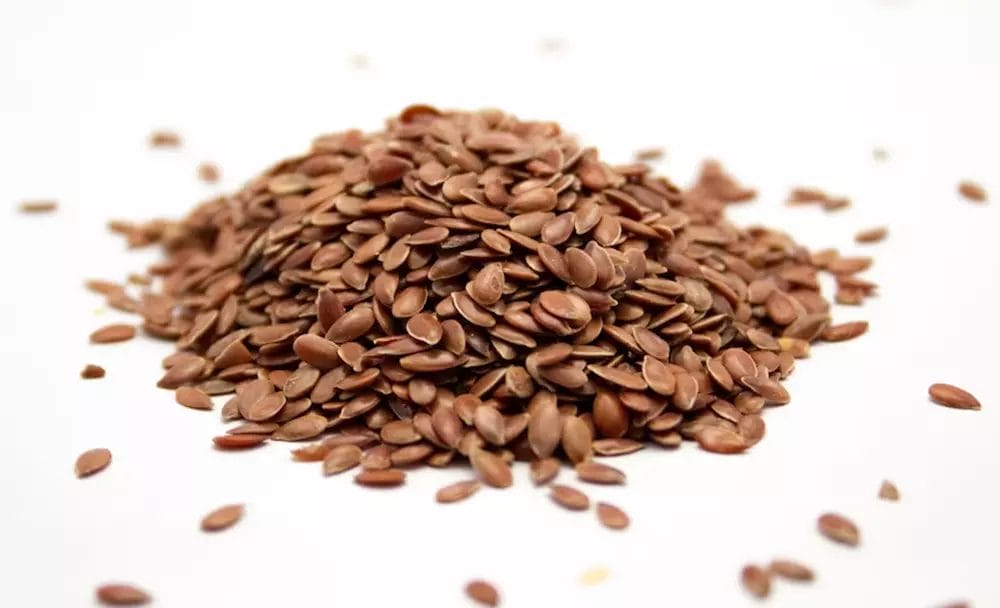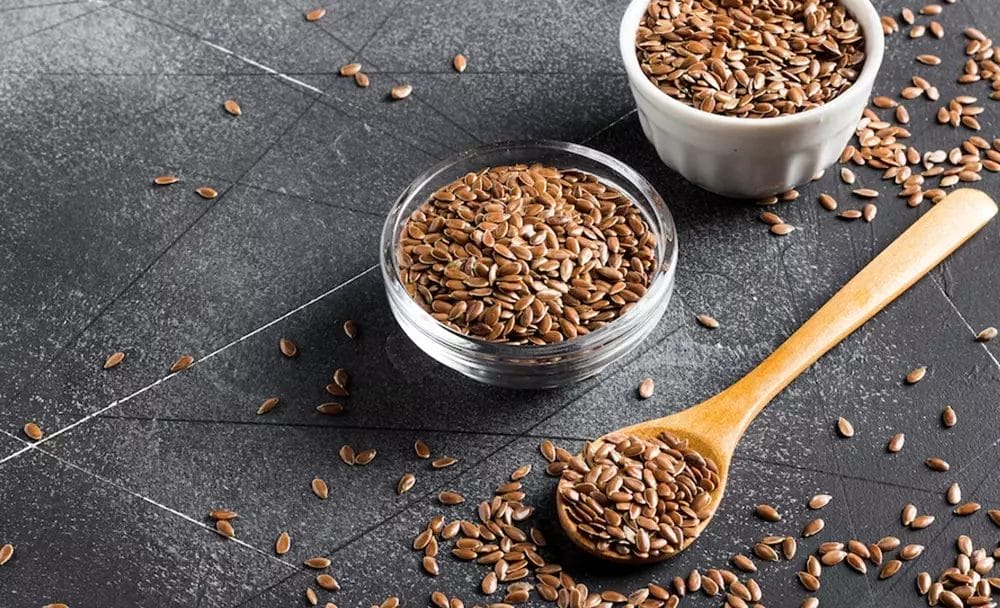This article is reviewed by an expert

Flax seeds are small, brown or golden seeds that come from the flax plant (Linum usitatissimum). In traditional Ayurvedic sources, flax seeds are described as Nilapushpi or Atasi. Cultivated for thousands of years for their fibre, oil and medicinal properties, the seeds have regained popularity in recent decades as a health food. Flaxseed benefits are easily accessible as the seeds have a mild, nutty flavour and can be eaten whole or ground into a meal or flour.
Flax Seeds Nutritional Profile
Flax seed nutrition is notable because of its high content of fibre, omega-3 fatty acids, and lignans. One tablespoon (9 grams) of whole flax seeds provides [1]1:
- Calories: 48
- Fat: 3.79 grams (of which 2.4 grams are omega-3s)
- Carbs: 3 grams (of which 2.4 grams are fibre)
- Protein: 1.6 grams
Flax seeds also contain essential nutrients such as vitamin B6, folate, iron, zinc, thiamine, copper, magnesium, manganese, potassium and selenium.
Health Benefits Of Flaxseed
Flax seeds have been associated with various health benefits, such as:
Cardiovascular Health
Flax seeds are a good source of alpha-linolenic acid (ALA), a type of omega-3 fatty acid that can lower blood pressure, cholesterol levels, inflammation and the risk of heart disease and stroke. Flaxseed oil benefits are notable in this regard with their high concentration of ALA, lignans and fibre [2].
Blood Sugar Control & Diabetes Prevention
Flax seeds have a low glycaemic index and can help slow down the absorption and digestion of sugar. They can improve insulin sensitivity and lower the risk of type 2 diabetes, with some studies showing that flaxseeds can prevent insulin resistance [3].
Weight Management
Flax seeds are high in fibre and water, which can help increase satiety and reduce appetite. This flaxseed benefit has also been confirmed with studies showing that flaxseed supplementation not only supports weight loss, but it may also help reduce stubborn belly fat [4].

Cancer Prevention
Flax seeds contain lignans, which are phytoestrogens that can modulate hormone levels and inhibit tumour growth. Flax seeds have been linked to a lower risk of breast, skin, colon and lung cancer [5,6].
Skin Health
In addition to adding flaxseed oil to your diet, you can also use flaxseed gel for face masks. Evidence suggests that flaxseed oil can improve skin health in women with sensitive skin and it can also reduce skin inflammation, protecting against numerous inflammatory diseases [7].
Hair Health
The use of flaxseed for hair has become increasingly popular because of flaxseed benefits for hair that are mainly linked to their high content of B vitamins. You can either use flaxseed oil for hair along with a hair growth oil such as Bhringraj or use the seeds to create a flaxseed gel for hair.
Vegan Protein
With 18% protein content, flax seeds are a good plant-based food for vegans looking to boost protein intake. Keep in mind that flax seeds do not provide complete protein as they are only rich in arginine and glutamine, but do not contain the essential amino acid lysine [8].
How To Consume Flaxseeds
Flaxseeds benefits are easily accessible as it is a versatile food that can be easily added to your diet in various forms. You can eat flaxseeds raw, sprinkle them as garnishing on salads, yogurt, oats, or even add them to smoothies and soups. They are also a good addition to baked foods as they add a nutty flavour.
In addition to the whole seeds, you can also use ground flaxseed or flaxseed powder, which you can then use as a healthy flour instead of corn flour. Similarly, flaxseed oil can be used for cooking and as salad dressing that enhances both the nutritional value and flavour of food.
When using flaxseed as a topical treatment for your hair or skin, you can prepare flaxseed gel by boiling whole flax seeds in water for about 10 minutes.
Flaxseed Side Effects
Flax seeds are generally safe, but consuming them in large quantities can cause problems in some people such as:
- Bloating, gas, abdominal pain, constipation or diarrhoea due to the sudden influx of high fibre.
- Flax seeds contain phytoestrogens, which are plant compounds that can mimic the effects of oestrogen in the body. In some individuals, this could interfere with treatment for hormonal disorders.
- Flax seeds may interact with certain medications that affect blood clotting, blood sugar and blood pressure levels.
Conclusion
While flaxseed is undeniably healthy and a good addition to your diet, they should be consumed in moderation and be part of a healthy balanced diet. In addition to flax seeds, you can also consider including other healthy seeds, such as chia seeds.
References:
- https://fdc.nal.usda.gov/fdc-app.html#/food-details/1100610/nutrients
- https://www.ncbi.nlm.nih.gov/pmc/articles/PMC4152533/
- https://academic.oup.com/nutritionreviews/article/76/2/125/4713926?login=false
- https://onlinelibrary.wiley.com/doi/10.1111/obr.12550
- https://www.frontiersin.org/articles/10.3389/fnut.2018.00004/full
- https://link.springer.com/article/10.1007/s11912-018-0704-z
- https://www.ncbi.nlm.nih.gov/pmc/articles/PMC6567199/
- https://www.sciencedirect.com/science/article/abs/pii/S030881460400319X


















